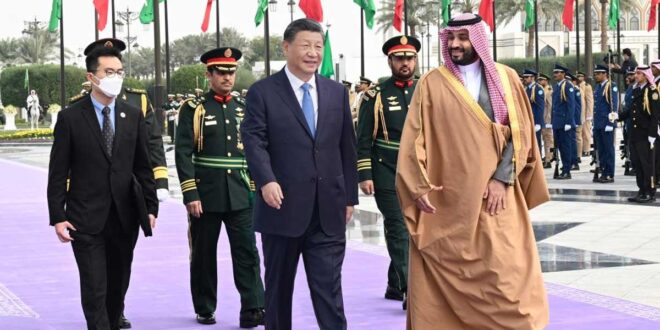With a growing economic and political influence, China has played increasingly significant roles in world affairs. China has gained critical power in Southeast Asia and Africa in recent years. Meanwhile, the latest Chinese proposal for peacefully solving the ongoing war in Ukraine has further proven China’s ambition to become a significant player in world affairs.
China has also risen to be a critical participant in Middle East affairs. Earlier, China showed great interest in participating in and facilitating Israel-Palestine peace talks. Furthermore, Iran and Saudi Arabia, two rivaling Middle East countries, have signed a historical agreement to reestablish the relationship, and China served as a peace broker in this process.
The signing of this agreement comes as a surprise to many. However, China rising in the Middle East is not something new. The increasing Chinese influence in economics and politics in the region, China being a trustworthy partner to the Middle East, and the changing relationship with the traditional players in the area, namely the United States, have contributed to the rise of China in the Middle East politics.
China has built a stronger relationship with the Middle East in recent years, and the connection helped China become a competent peace broker between Iranians and Saudis. China is one of the biggest oil buyers for Iran and Saudi Arabia, and most of the economic collaboration concentrates on energy. Last year, China signed a collaborative agreement with the Tehran government, promising 400 billion US Dollars of investment in Iranian infrastructure and other projects. As for Saudi Arabia, a similar deal was also signed between the two countries during a visit of President Xi. The pact also includes cooperation in cloud computing and high-tech projects.
Meanwhile, the bilateral relationship between China, Saudi Arabia, and Iran did not stop at the economic perspective. Saudi Arabia bought Chinese missiles in the 1980s, even before establishing a diplomatic relationship. China addressed former king Abdullah as a “dear friend” after his death, further signaling the profound connection between the two countries.
At the same time, China considers Iran a full-scale strategic partner. China actively participated in the negotiation process of the JCPOA, seeking a peaceful end to the Iranian nuclear crisis. Also, in the recent joint statement after the Iranian president visited Beijing, the two countries committed to working together to ensure a peaceful future.
Other than the growing relationship, China is considered a trustworthy partner by Middle East countries. China lacks the motivation to break down the security and political structure of the Middle East led by the United States. Most Chinese interests are focused on the economic perspective. China has not sided in any of the regional conflicts. China has been consistent in calling for international actions, such as the United Nation’s peacekeeping operations, to address security issues. China benefits significantly from the political status quo in the Middle East while lacking the willingness and the resources to involve directly in regional politics.
This neutrality and cautiousness reflect in Chinese official statements relating to the area. China avoids making a one-sided assertion in Middle East affairs. It has stated its support for the two-state solution between Israel and Palestine and promoting a peaceful solution to the ongoing conflict. China has also assured the Iranian government that it respects Iranian territorial integrity after the controversial statement from the China-GCC summit. These moves have secured Chinese credibility in the region.
This neutrality and practicality did not go unnoticed by the countries in the region. One of the signs is the growing political relationship between Beijing and the Gulf States, as the China-GCC Summit last year proves. Even after the controversy with Iran, the Chinese top officials still visited Tehran as planned. Some experts have claimed that the participation of China has given the long-lasting enemies an opportunity to negotiate for a peaceful relationship.
Furthermore, the shifting relationship between the United States and the Middle East has further allowed China to shine in the Middle East. Some argued that the negotiationis a middle finger to President Biden from Saudi Arabia. However, the United States holding back in the Middle East is not news. After a long and costly war in Iraq and a challenging economic situation, the United States cannot maintain the same military presence as it did in earlier times. This downsizing has caused a divide between Washington and its allies despite persuading them that the US will maintain its presence in the Middle East.
Beyond the US holding back, the relationship between the US and the Middle East is also filled with friction in recent years. The breakdown of the JCPOA has dramatically weakened the United States’ credibility and trust in the international mechanism. The human rights issues have also created a divide between Washington and Riyadh. The energy policy divide further alienated the two countries. It becomes evident for the regional powers seeking to introduce a new player to balance the US influence.
From a Chinese perspective, a peaceful Middle East perfectly suits the Chinese vision and strategic interests. From Belt and Road Initiative to the energy collaboration, a peaceful Middle East helps China to achieve its economic goals. The Beijing government will take the opportunity to achieve such goals. Chinese desire for stability meets with the Middle East’s wish to counterbalance, allowing China to gain more leverage in the Middle East, further expanding its influence.
China is not in competition with the United States in the Middle East. However, the success in breaking a deal between Saudi Arabia and Iran has pushed China to the front stage of Middle East politics. The growing economic ties with Riyadh and Tehran, the long tradition of neutrality and the credit it received, and the US withdrawal from the Middle East have turned China into an unavoidable influence in the Middle East!
 Geostrategic Media Political Commentary, Analysis, Security, Defense
Geostrategic Media Political Commentary, Analysis, Security, Defense





